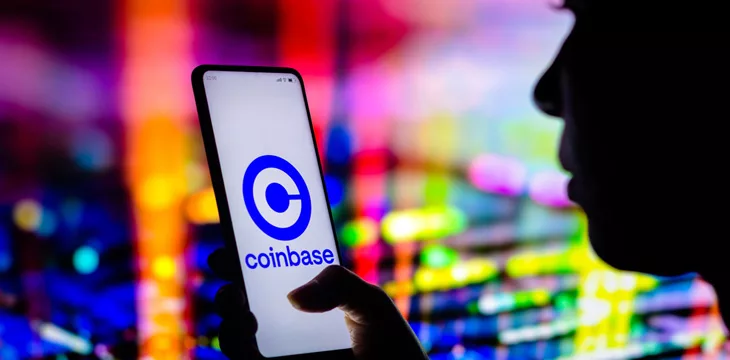|
Getting your Trinity Audio player ready...
|
Coinbase (NASDAQ: COIN) customers are complaining about unexplained account closures and stalled withdrawal requests as the digital asset exchange’s U.S. legal difficulties mount.
The past week has seen a rising number of Coinbase customers complaining on the exchange’s Reddit forum about their accounts being closed without any explanation. Many of these complaints include quotes from Coinbase that refuse to divulge the justification behind the closures, in some cases citing “a variety of factors,” all of which go unexplained due to “security reasons.”
While many of these Coinbase communications emphasize that the exchange isn’t blocking these customers from transferring their digital assets off the exchange, some customers claim their attempts to transfer their assets have failed.
Also, Coinbase doesn’t appear to be allowing these individuals to convert their assets to fiat cash and withdraw via traditional banks, stating that “we can no longer continue our banking relationship.” Pressed for details, Coinbase responds with boilerplate messages that it is “unable to elaborate on our process for this.”
Coming as it does so soon after the U.S. Securities and Exchange Commission (SEC) filed civil charges against Coinbase for offering unregistered securities and combining the activities of a securities exchange, broker, and clearing agency, customers can be forgiven for expressing concern over access to assets held on the exchange.
The account closures could be a belated effort by Coinbase to close any gaps that may currently exist in the exchange’s know your customer (KYC) processes, particularly as it relates to accounts that may have been opened during Coinbase’s more, er, freewheeling phase before its 2021 listing on the Nasdaq exchange.
That might explain why it’s preventing further interactions with banks. But it doesn’t eliminate the possibility that Coinbase and/or its market-making offshoots are currently reluctant or downright unwilling to part with any cold hard cash.
Tokens, casino chips, tomato, tomahto
“Past isn’t always prologue,” but forewarned is forearmed, as they say. As someone who spent the previous decade writing about the gambling industry, the frustration expressed by Coinbase customers isn’t entirely unfamiliar.
Take Everleaf Gaming, the former Malta-licensed online gambling business, which seized an opportunity to cut off its U.S. customers following the seizure of an extremely small amount of cash from a third-party processor.
Everleaf never did make its U.S. customers whole and was soon finding ways to avoid paying customers in other jurisdictions. An Everleaf exec was ultimately charged with ‘misappropriating’ customer funds, but only after the site had long since shut for good, leaving countless customers high and dry.
Then there was Purple Lounge, a subsidiary of a U.K. publicly traded company, which went similarly belly-up after a prolonged period of slow-rolling customers’ withdrawal requests. Purple Lounge employed the familiar tactic of asking customers to re-verify their identity, along with reassurances that since its parent company was traded on the London Stock Exchange, “your money are safe [sic] with us.”
Some sites, such as the infamous Lock Poker, were outright scams from the start. After several years of using every excuse in the book to avoid paying its players, the site finally closed, with insiders discussing how senior management lived largely on players’ cash. Estimates on total player losses ranged as high as $15 million.
Admittedly, none of these sites were based in the United States and thus lacked the non-cash assets that U.S. authorities could readily seize… like, say, Coinbase CEO Brian Armstrong’s $133 million California crib. So Coinbase may have more powerful incentives to (eventually) do right by their customers.
Nevertheless, Armstrong recently began signaling that Coinbase’s future lies outside America, despite nearly 90% of its current revenue being U.S.-derived. While Armstrong later tried to walk back this tough talk, last month saw the launch of an international Coinbase site that engages in the kind of sketchy derivative products it’s not allowed to offer to U.S. customers.
Wanted: millions of bozos
Clearly, finding new revenue streams is of paramount importance because Coinbase is cash-poor. Its most recent earnings report showed the company leaning heavily on two factors: interest earned from custodying its customers’ USDC stablecoins, and commissions from trading’ other crypto assets,’ aka tokens not named BTC or ETH (more commonly referred to as ‘shitcoins’).
Two problems: First, USDC has lost over one-third of its market cap since March and currently sits at one-half of its June 2022 peak of $56 million, which could explain why Coinbase recently doubled its USDC rewards rate to 4% (in addition to slowing the sell-off of existing USDC, it could provide Coinbase with badly needed cash flow from customers who buy USDC to custody).
Second, these third-tier tokens on which Coinbase is reaping commissions are the exact kinds of unregistered securities that have got them into their current dilemma with the SEC.
But Coinbase’s systemic woes are rooted in the fact that the ‘crypto’ ecosystem has exhausted its supply of suckers willing to feed sucker money into the system. As Mizuho Securities senior analyst Dan Dolev recently observed, “I think it’s game over for Coinbase. I think the stock is going to the $20s.” (Coinbase closed Monday at $55.59.) Coinbase can’t attract new retail customers “because retail got burnt on crypto and they’re not coming back.”
The Onion may be a satirical publication, but this fake quote from Jeremy Allaire—CEO of Circle, Coinbase’s USDC partner—isn’t far from reality. “We’re calling for millions of bozos to be infused into the crypto market to stave off collapse … the important thing now is to get many, many more idiots confused enough to believe they have any chance in hell of making money off this grift.”
ETF WTF
Seemingly riding to Coinbase’s rescue were two items from last week’s news that gave investors the warm and fuzzies. First was Jack Dorsey announcing that his new BTC self-custody wallet Bitkey would integrate with Coinbase and Cash App, the latter the premier product of Dorsey’s Block (NASDAQ: SQ) payment processor.
The deal is intended to make it easier for Bitkey customers to either transfer their BTC to or buy BTC from Coinbase and Cash App. Block is bleeding nearly as much red ink as Coinbase, so every potential revenue stream must be pursued, regardless of the social cost.
Cash App has a reputation for appealing to a disproportionately large percentage of black customers and recently came under fire from short-seller Hindenburg Research for having “systematically taken advantage of the demographics it claims to be helping.”
A recent New York Assembly hearing featured plenty of discussion around digital asset firms targeting “marginalized communities,” including people of color. The New York Attorney General’s chief deputy for economic justice called out these companies for engaging in “predatory inclusion,” citing data showing these same communities suffered disproportionately large losses during ‘crypto’ crashes, rug-pulls, and the like.
The other major news was asset management colossus BlackRock’s application to the SEC for a BTC exchange-traded fund (ETF). It’s technically labeled a trust, which would seem to give it more in common with Grayscale’s troubled GBTC trust than a traditional ETF. (Experts insist BlackRock’s plan is a real ETF, although the SEC will ultimately make that call.)
Regardless, BlackRock reportedly plans to use Coinbase Custody for its BTC hoard (the parties have been discussing this for years). Blackrock’s application is littered with caveats regarding Coinbase’s current tiff with the SEC and the possibility that Coinbase’s custodial role might need to be delegated to another firm. But even if the ETF is approved, Coinbase’s bottom line boost isn’t expected to be mega.
Are we the baddies?
Meanwhile, Coinbase continues its war of words with the SEC and—based on the exchange’s persistent efforts to bend the truth beyond its breaking point—appears more concerned with public relations than mounting a serious legal defense.
Coinbase appears to be hoping that its lobbying cash will boost efforts by some members of Congress—like the ‘SEC Stabilization Act’ introduced last week that calls for the removal of Gary Gensler as SEC chair—to pull Coinbase’s ass out of the fire before the suit goes before a judge.
Coinbase believes that none of the tokens listed on its exchange are securities. The SEC has accused Coinbase of listing multiple unregistered securities and has hinted that it considers nearly all tokens to be securities. (And that list may well include BTC and ETH.)
Coinbase’s highly controversial process for deciding which tokens to list has always been based on one simple factor: how much the exchange stands to gain from trading commissions. Remember, Coinbase listed Tether’s controversial (USDT) stablecoin just days after the exchange’s Nasdaq debut, despite Tether having already been subjected to eight-digit fines for, among other crimes, flat-out lying about the reserves backing its tokens. And USDT remains on Coinbase, despite its involvement in bank fraud and terrorist financing.
Meanwhile, Coinbase has never deigned to list BSV, despite its status as perhaps the only digital asset that truly qualifies as a commodity. Apparently, the BSV Blockchain’s focus on utility, rather than speculative token flipping makes BSV a bad fit for Coinbase’s utility-free business model.
Coinbase (like Dorsey’s Block) is a platinum member of the Crypto Open Patent Alliance (COPA), a group established for the express purpose of strangling BSV blockchain in its crib but which has become something of a ‘who’s who’ of ‘crypto’ criminality.
COPA member (and Coinbase rival) Kraken paid $30 million in February to atone for its U.S. regulatory shortcomings, while MicroStrategy (NASDAQ: MSTR) CEO Michael Saylor—who was the principal culprit in a major stock fraud settlement in 2000—is currently battling personal tax fraud charges in the District of Columbia.
The Binance exchange isn’t a COPA member, but founder Changpeng ‘CZ’ Zhao led the BSV delisting campaign in 2019. Binance is currently the subject of two U.S. federal civil suits, while criminal charges are expected to follow any day now.
It’s worth asking why all of BSV’s opponents inevitably find themselves on the wrong side of the law. Perhaps if more people realized what was really going on, ‘crypto’ wouldn’t need to spend so much time doing damage control.
Follow CoinGeek’s Crypto Crime Cartel series, which delves into the stream of groups—from BitMEX to Binance, Bitcoin.com, Blockstream, ShapeShift, Coinbase, Ripple,
Ethereum, FTX and Tether—who have co-opted the digital asset revolution and turned the industry into a minefield for naïve (and even experienced) players in the market.

 05-09-2025
05-09-2025 





